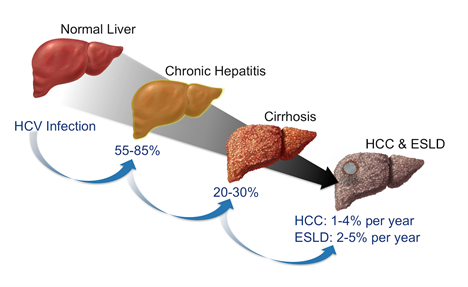Hepatitis C and Liver Cancer: What to Know
Hepatitis C has become the most leading source of cancer. Although many people who got infected with hepatitis C get well after a month or two, the others will have chronic hepatitis C that will cause liver damage and liver cancer. Having chronic hepatitis C can lead to neck cancer, which is quite common in patients with hepatitis C.
Reasons Behind People Getting Hepatitis C
- Contact with infected blood from a diseased person
- People who have been diagnosed with HIV
- Sharing an injection with a diseased person will cause his/her blood to enter your body
- Using needles for drugs
- A pregnant woman who is diseased can pass the disease to her child
- Having sexual activity with a diseased person might cause infection to some people.
The best thing a person can do to save himself/herself from this disease is to get tested as soon as he/she notices symptoms of hepatitis C in the body.
Also Read: NATURELO Vitamin C with Organic Acerola Cherry Extract: The Best Vitamin C Supplement | A-List of 5 Common Skin Problems
Hepatitis C Myths
- Many people think by sharing food with a diseased person, it can cause hepatitis C.
- Many rumors have spread that by touching a diseased person, you can contract hepatitis C.
- People think that if a person who suffers from hepatitis C sneezed on you, you would get the disease.
However these are only myths and are not facts. The most common way a person gets infected is through blood contact.
How Hepatitis C Destroys the Body
After hepatitis C infects your body, you would not get many symptoms for a while since the infected cells damage your body slowly. After a time when the disease has become chronic, it will cause damage to your liver. The virus will cause an increase of the infected cells in the body, which multiply at a slower rate but causes very high damage to the liver in a very quick time. Also, once you get infected with the virus, the symptoms are mostly unnoticeable, which will later cause many problems to your body. The virus will try to prevent the liver from working properly, which will also harm your body.
Also Read: How is the covid-19 pandemic affecting Industries? | Healthy food: expectation vs reality
Why Treatment is Necessary
The worst part about having hepatitis C is that although there are cures for hepatitis A and hepatitis B, there is no cure for this one. The only thing you can do is get treatment for the virus.
Getting the treatment is essential as it can decrease liver cancer chances by about 70%. The treatment is also easy and modern and has changed from the previous ways, which caused many side-effects to the patients. The new treatment only requires the patients to take a daily dose of the medicine their doctor prescribes.
What Will Happen if You Forget to Take Your Medications
Forgetting to take your medicine is quite common among people who have recently been diseased. However, this can cause serious complications to your body if you have liver disease. Once you stop taking medicine at the prescribed time, the virus cells present in your body will try to become immune to these medicines. After stopping your medicine before consulting your doctor, the cells will multiply more rapidly in very little time, which can have serious negative impacts on your body. If the virus has become immune to the medicines, there isn’t much the doctors or anyone can do after that. Then, the virus will replicate and prevent the liver from working properly, causing liver damage and, later, liver cancer.
Why People Get Liver Cancer After Hepatitis C
If you have hepatitis C, the chances of liver cancer are quite low but never zero. The main reason people get liver cancer after hepatitis C is by drinking excessive alcoholic beverages. Controlling alcohol is necessary to have a healthy liver; limiting or stopping the consumption of alcohol altogether can-do wonders to your liver and your body and help prevent liver cancer. Another reason people get liver cancer is by smoking. It not only causes damage to your liver but also your lungs. Stop or limit smoking as much as you can to prevent liver cancer.
Also Read: Ways to Eat Healthy on a Tight Budget | 5 All-time Best Hair Cut Styling that Makes Your 2021 Way Better
How to Prevent Liver Cancer After Getting Hepatitis C
If your body is unhealthy, there’s quite a possibility that you can get liver cancer after getting infected by hepatitis C. You should try to maintain your diet and sustain a healthier body. Through regular exercise and yoga, your body will become healthier, and you will become more fit. You should also drink and eat healthy food products which are essential to your body. Getting those necessary vitamins, minerals and nutrients are necessary to have a healthy liver.
You should also stop eating junk food and limit the sugary drinks which can cause a degrading body. By staying in the regulation of healthy food and a proper diet, your body will protect you from many diseases and help make your immune system stronger. This will help you have the proper and happy lifestyle to avoid liver cancer or any other disease.
Also Read: B. Pharma: A rewarding career option in the healthcare industry | Best Prescribed Medicines for Erectile Dysfunction to Find a Permanent Solution!
How Hepatitis C Leads to Liver Cancer
Once you get diseased with hepatitis C, treatment is necessary as soon as you can get it because if the body is infected, the infectious cells will start damaging the liver, causing cirrhosis. The damage caused by these infectious cells will make the liver generate protective cells which can help the liver. However, this generation of protective cells from the liver causes mutation as it happens every time the infected cells harm the liver, which ultimately causes liver cancer. People who suffer from hepatitis C should get checked for cirrhosis from time to time as preferred by your doctor as this can help in knowing the time available to prevent liver damage. Consulting your doctor and following all the guidelines advised can not only help in avoiding liver cancer but can also save lives.










